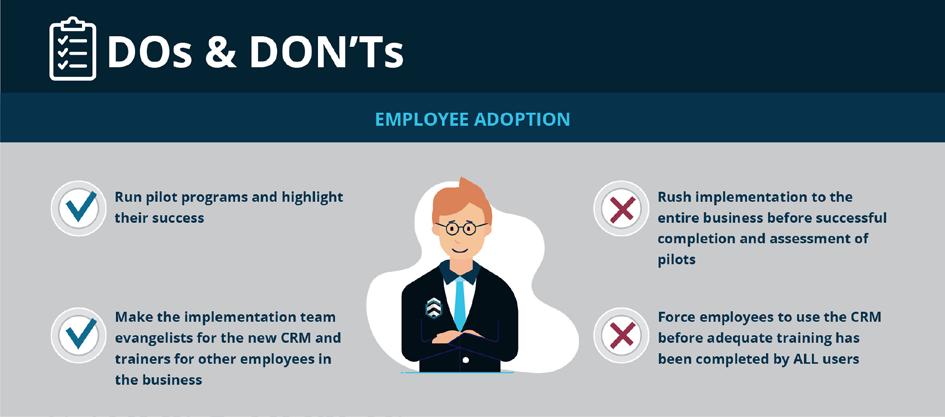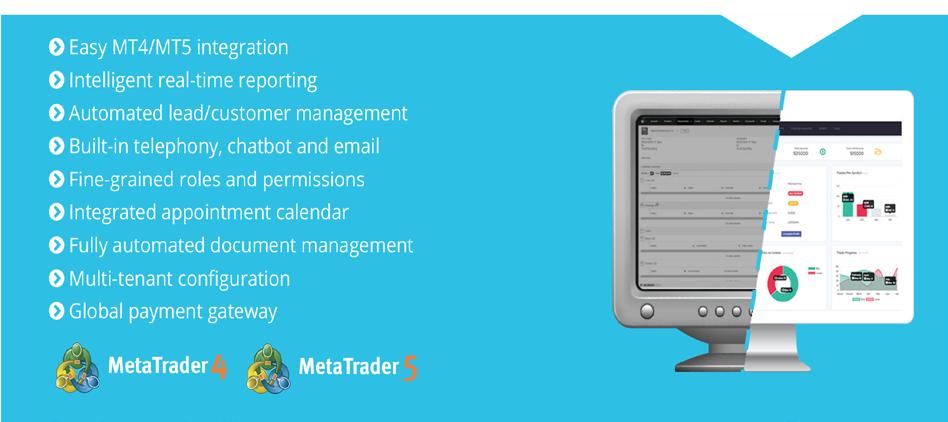
4 minute read
CHOOSING A CRM? Five things every Forex business needs to know and do.
by PaulGC
Impact Tech Ltd
SOTERIS CHARALAMBOUS Head of content, Impact Tech Ltd
Advertisement
Increasing competition and regulation within the Forex industry makes choosing a purpose-built CRM platform a logical and advantageous choice. But unless the decision-makers tasked with sourcing the new platform do their research and implement according to a plan the outcome is likely to be far lower than expectations.
A starting point for many when choosing a new CRM is whether it can do everything the existing platform can do. The logic is that it minimises disruption, but it also misses a huge opportunity to look at the existing processes and see how they can be improved.
If the idea is for the business to stand still why change the platform in the first place? CRMs are not a sales tool. They should serve every customer-facing function in your business. Involving every

department in your business in the selection, planning and testing of a new CRM will produce a significantly better outcome than if the decision is left to a single department or decision maker.
This requires defining and mapping processes as well as setting out business goals and needs. However, the overarching objective is that your new CRM puts the customer first by helping your customers facing employees do their jobs better than they can with whatever platform they are using currently.
Some Forex businesses are currently experiencing an example of this requirement after the EU updated their rules on financial institutions processing Cryptocurrencies. 5AMLD came into effect on January 10 and has already closed one business and underlines the urgent need to update KYC/onboarding process. For every business processing Cryptocurrencies this means changing processes in the CRM and highlights the benefits of using a purpose-built solution for Forex businesses like Impact CRM.
The customer input fields in Impact CRM are fully self-customisable to follow a rule-based flow that meet the latest KYC and regulatory requirements of the territory while creating a frictionless onboarding experience for customers.
Tracking the progress of every customer’s KYC process and AML is easy and regulatory auditing is simplified with automated notifications when ID documents are due for renewal.
Every Forex CEO is aware that regulatory changes are having a bigger impact on businesses offering financial services. Investing in a platform that both improves their customers’ onboarding process and helps their support team adapt to regulatory changes effortlessly is one way to minimise this effect.


Failure to properly address business and user needs will slow down the implementation process, derail user adoption and lead to damaging relationships with customers. Ultimately, the outcome of introducing a new CRM will be failure as is the case +50% of the time across most industries.
Planning and testing provide the opportunity to get valuable user information and apply it to the customisation and implementation process. A new CRM is the opportunity to increase cooperation between teams and departments but that requires cross-functional coordination.

There are some key actions that every CRM implementation project manager should ensure happens to increase the success rate of the new platform and accelerate its adoption.
Running pilot schemes for the new CRM to increase familiarity with the new platform among key users. When the benefits are experienced by these users, they will become evangelists for the new CRM and be able to help train team members as to how to achieve the highest benefits from the system through their knowledge of its features.
Integration with existing applications is also essential. Training to learn how to use a new platform is more than enough additional work for most employees regardless of the benefits it can bring. Being told that key business apps need to be replaced in order to maximise the functionality of the new platform is going to lead to resistance.
Equally critical is the process of data migration. Customer data is an asset that needs to be preserved in order to be leveraged by the new platform. Ensure back-ups are made before data cleansing takes place and insist on the process is automated to save time and reduce potential human input errors.

Your CRM vendor should advise you on how to manage the data migration process. It’s often the case that data extraction from a legacy database is a multi-step process which involves creating views in order to consolidate the information held in different sources.
Every user database carries duplicates. The transfer process is the opportunity to address this issue. If the number is low the deduplication functionality is the most efficient way to tackle duplicates.
When implemented correctly a new CRM will become the hub for all your customer-facing activities and provide all the information users need in a timely and intuitive way. Your customers will also feel the benefits. Communication and service will become more efficient and precise. Cross-selling opportunities will be more successful as the customer experience (CX) delivered improves.

If the platform you choose is an AI-based data intelligence solution the benefits are even greater. Your understanding increases of how customers act in relation to a scenario. Automated lead management can reduce prospecting time by 50% by 2022 20% of sales training and coaching solutions will provide in-context personalisation based on machine learning.










